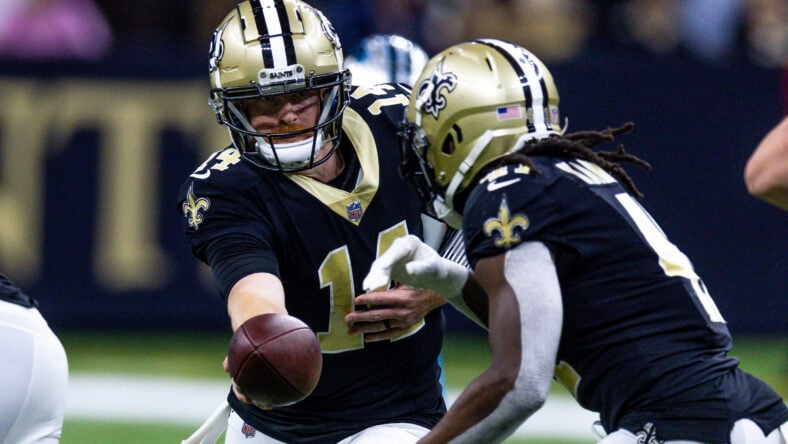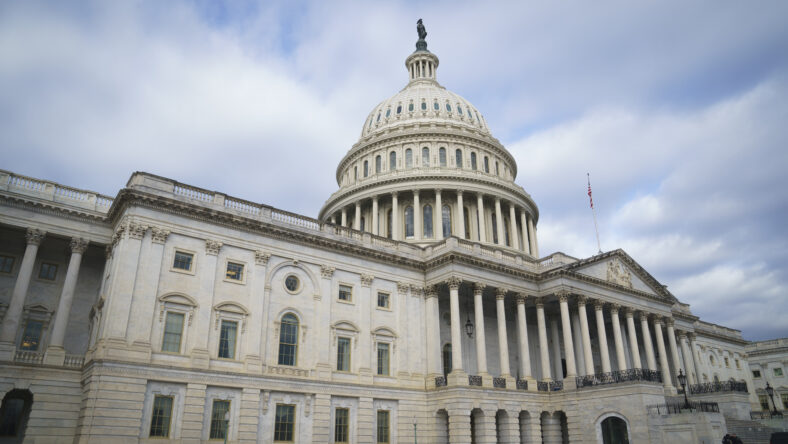Congressional Report: “NFL Helped Cover Up Commanders Toxic Work Environment,” Buried Findings of Wilkinson Investigation
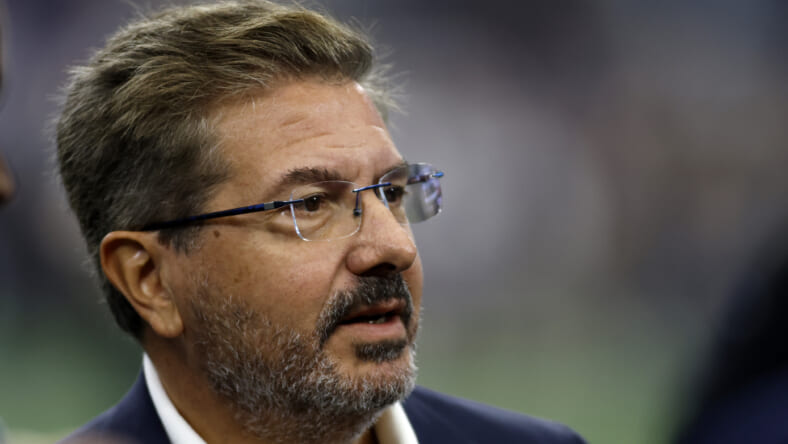
A scathing report from Congress released on Thursday accused the NFL of helping Commanders owner Daniel Snyder cover up the Commanders’ toxic work environment and burying the findings of the Wilkinson investigation. The report also claims that Snyder “obstructed” a congressional investigation that spanned almost 14 months. It alleges that the NFL “allowed Mr. Snyder to target his accusers and impede the Wilkinson investigation.”
The Congressional report claims that Snyder interfered with the Committee’s investigation in several ways, including “by leaking derogatory documents about witnesses” in retaliation for their cooperation, refusing to release witnesses and former employees from non-disclosure agreements so they could fully cooperate, and blocking the Committee’s access to key documents.
The 79-page report claims that the NFL helped bury the Beth Wilkinson Investigation findings, after the team and later the league hired her to investigate allegations by former employees of sexual harassment at the Commanders organization.
The report goes on to say that the NFL failed to prevent Snyder’s continued involvement in team operations and was aware of Snyder’s alleged campaign to blame former team President Bruce Allen for the team’s toxic workplace.
Congress began investigating the NFL and Snyder after the league refused to release the findings of the internal investigation by attorney Beth Wilkinson. The Commanders were fined $10 million dollars after the league concluded that the team did foster a toxic workplace where sexual harassment frequently occurred. However, owner Dan Snyder was not directly implicated and the league’s press release stated there was no evidence Snyder knew or was involved.
Congress concluded that the NFL allegedly allowed Snyder to negotiate the outcome of the investigation with a behind the scenes deal between Snyder and the league.
The Congressional report accuses the NFL of forming a “joint legal agreement” with Snyder to essentially downplay the Wilkinson findings and allegedly work to obstruct the probe.
“The League, working closely with the Commanders through a previously undisclosed common interest agreement, refused to produce more than 40,000 responsive documents, including the findings of the Wilkinson investigation and materials from Ms. Wilkinson’s files,” the report reads.
Documents obtained by the Committee reveal that on September 8, 2020, the “NFL and the Commanders entered into a common interest agreement that aligned the parties’ legal interests regarding the Wilkinson Investigation and any potential future litigation, allowing them to pursue a ‘joint legal strategy.'”
The alleged agreement prevented the NFL and the Commanders from releasing, without the other’s consent, any information exchanged between the Team and the League during the investigation, according to the report.
“Evidence uncovered by the Committee shows that in or around October 2020, the NFL directed Ms. Wilkinson to abandon efforts to complete a written report and provide an oral briefing instead,” the report reads.
The report says that such a joint agreement would have required the approval of three quarters of team owners and that Goodell himself had no authority to approve a $10 million dollar fine for the team as the sole punishment. The report shows an eerily similar side by side comparison of the terms of the discipline against the Commanders and the discipline levied by the NBA against Mark Cuban over his handling of sexual misconduct allegations within the Mavericks. The report alleges that Snyder thus had a hand in negotiating his own punishment with the league.
Blaming Bruce Allen?
The final report detailing Wilkinson’s findings was never publicly released and neither were the hundreds of thousands of emails allegedly reviewed during the course of the investigation. However, several emails between former team President Bruce Allen and former Raiders Coach Jon Gruden were leaked to the New York Times, detailing racist and offensive language used in the emails by Gruden. Following intense public pressure Gruden resigned.
Gruden is now suing the league, claiming the NFL and Snyder were behind the email leaks and he was the “fall guy” in a scheme to distract from the investigation into the Commanders.
Thursday, the Congressional report claimed that the NFL was aware of “Snyder’s campaign to blame Mr. Allen for the Commanders toxic workplace” and accused Snyder of leaking derogatory emails about other team employees in “retaliation.”
The report claims that Snyder, who sued the media publication Media Entertainment Arts WorldWide for defamation for allegedly trying to link him to Jeffrey Epstein, used that lawsuit to try to gather information on other Commanders employees.
Snyder allegedly claimed that the media reports, published in India, were an orchestrated effort by at least one of his former minority partners, John Moag, to defame him. In the course of the defamation suit, the Congressional report says that Snyder tried to use the litigation to subpoena information on team employees and use that information to blame Bruce Allen and defend himself against claims of sexual harassment and assault.
Snyder has denied these allegations.
Congress says it found that in April 2021, Snyder filed a petition in federal court to force the disclosure of documents and information from Mr. Allen and collected more than 400,000 emails from Mr. Allen’s Commanders email account.
“Mr. Snyder also used the information collected on Mr. Allen to present “evidence” to the NFL that Mr. Allen was responsible for the Commanders’ toxic work culture.”
The report goes on to say that Snyder allegedly showed the NFL “inappropriate Bruce Allen emails” to try to blame him for the toxic workplace.
“During his deposition, Mr. Snyder admitted that he undertook efforts to implicate Mr. Allen,” reads the report.
Here is an excerpt from Snyder’s testimony before Congress:
“Q: Did you make presentations to the NFL—did you or anyone acting on your behalf make presentations to the NFL regarding Bruce Allen and his role in the toxic work environment, as you’ve described it?
A: I believe we did.”
“Approximately four months later, in October 2021, Mr. Allen learned that many of the “inappropriate” emails obtained by Mr. Snyder from his Commanders email account had been leaked to the Wall Street Journal.
According to Mr. Allen, when he called NFL’s counsel, Lisa Friel, to complain, she indicated that the Commanders were responsible for the leak, stating: ‘We didn’t do it at the league office. It came out of their side’,” according to the report.
In his deposition, Mr. Allen testified that Ms. Friel allegedly informed him of Mr. Snyder’s “broader efforts to blame him for the Commanders’ decades-long toxic culture, including by making presentations to the NFL about Mr. Allen’s role in day-to-day operations of the Team.”
Mr. Allen explained, in his own testimony before Congress:
“Q: Did she ever share with you other information on your emails?
A: Other than she told me, “We’re aware of the emails.” They weren’t a part of the Wilkinson investigation. That the team gave them the emails and that there was a presentation at a—I don’t know if it was a league hearing or something between the league office and Dan where “he blamed you for everything.” I said, “Well, how can I be blamed for things when I’m working in Tampa? How do I get blamed for things that happened before I got there?” And she goes, “We know your resume,” noting that I wasn’t there when the early serious allegations were made.
Q: So she related to you that there was a presentation made by Mr. Snyder?
A: Yeah, by either him or his lawyer. I forget.
Q: Did she relate to you what was in that presentation?
A: She said it was a PowerPoint, a PowerPoint or a slide show, one of the—a phrase like that.
Q: And what was the purpose of that presentation, to your knowledge?
A: I guess to blame me for what happened.
Q: And who was that presentation made to?
A: I don’t know if it was—I don’t know who was at it. She was. And either Dan presented it or his lawyer or his PR firm presented it. It was one of the three.”
The emails referenced by the report may be the emails that also implicated Jon Gruden in his use of racist and offensive language.
The Congressional probe also found that during the Committee’s year-long investigation, Snyder allegedly “released internal documents from the email accounts of former employees who cooperated with the Committee investigation. Mr. Snyder’s efforts appeared designed to smear and intimidate witnesses and send a chilling message to others who were considering coming forward to share information with the Committee about the toxic workplace at the Team.”
On August 31, 2022, former Commanders President Bruce Allen testified before the Committee. However, the evening before his testimony, the report claims that “Mr. Snyder’s lawyers sent an email to Committee staff stating: ‘To facilitate a full examination of Mr. Allen, we have collected a set of documents, from his tenure at the team, that we believe would be relevant to his deposition.'”
The report says that the email allegedly suggested that the documents be shared with Mr. Allen so that he would “have an opportunity to review them prior to his deposition” and that the “documents included emails with embarrassing language and inappropriate content. These emails, which were apparently collected from Mr. Allen’s Commanders account, included those that had been leaked to the Wall Street Journal and New York Times in October 2021.”
When the Committee asked Allen “why he believed Mr. Snyder would provide the tranche of documents the night before his deposition, Mr. Allen explained that Mr. Snyder was ‘trying to send a message’ to him to ‘be careful.’”
Allen allegedly said, “he owns me with these emails, which affect my coworkers, the alumni, my family and friends.”
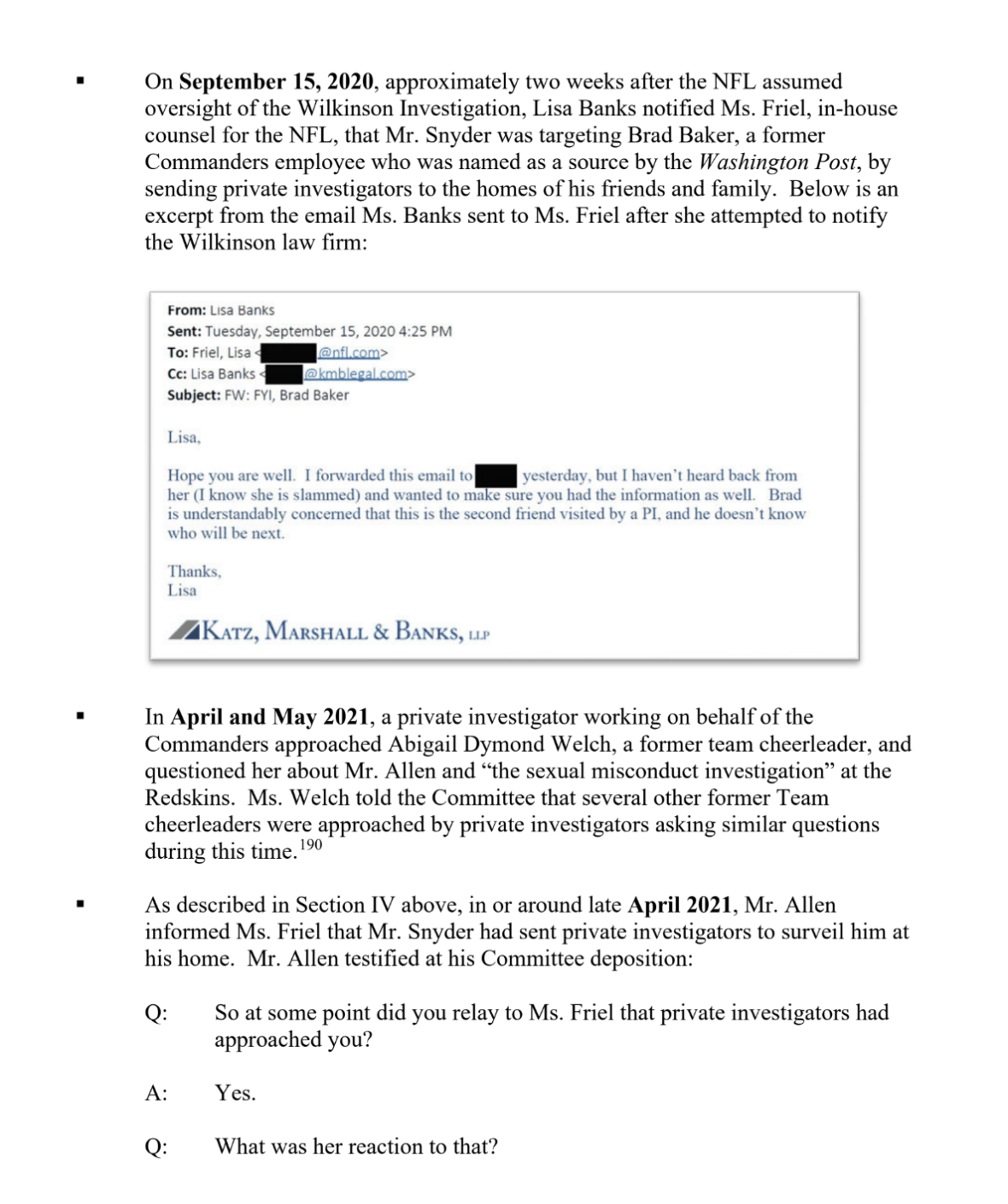
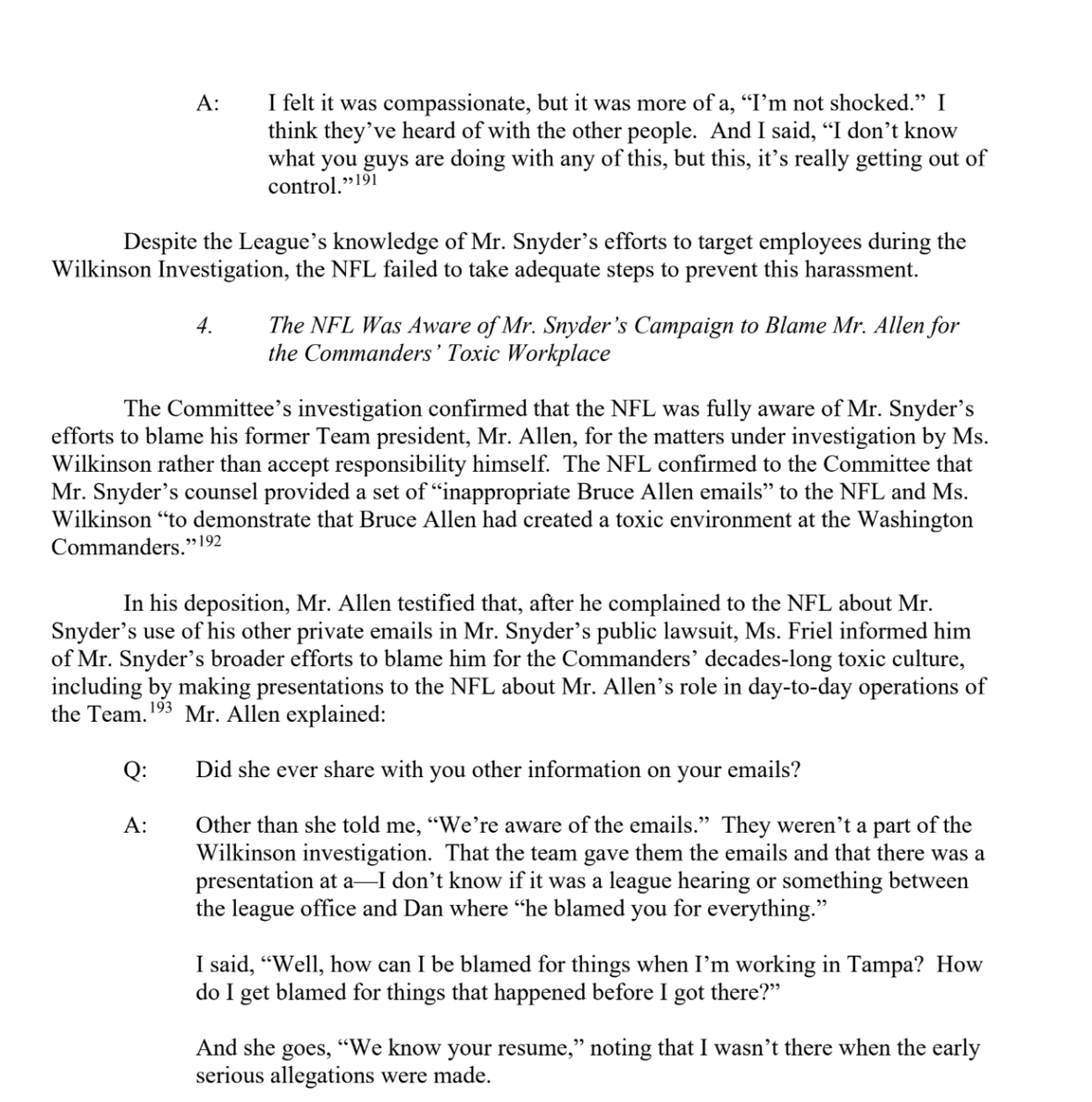
The report claims Snyder tried to blame Allen for the team’s toxic workplace because he felt Allen should not have said the team culture was “actually damned good” after a video of Jay Gruden allegedly smoking marijuana surfaced on TMZ a few days prior to his termination.
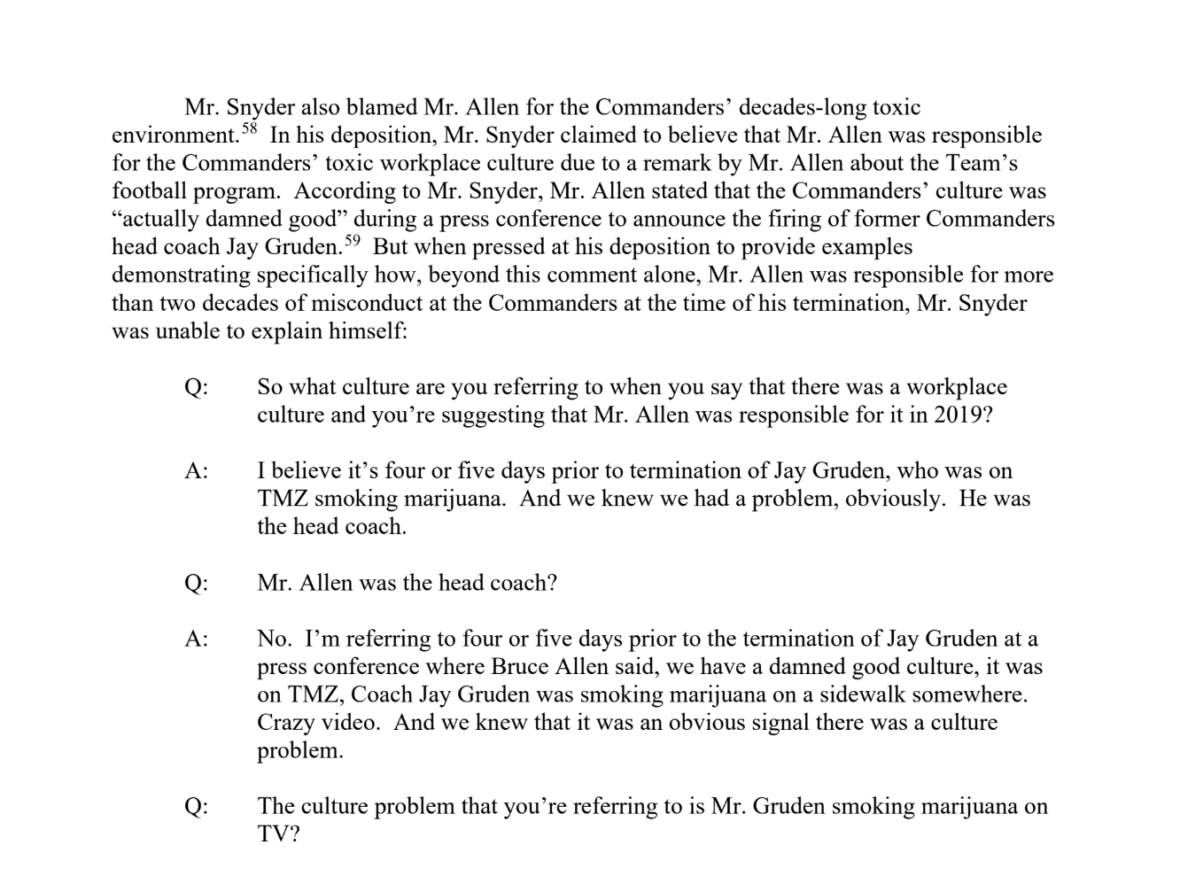
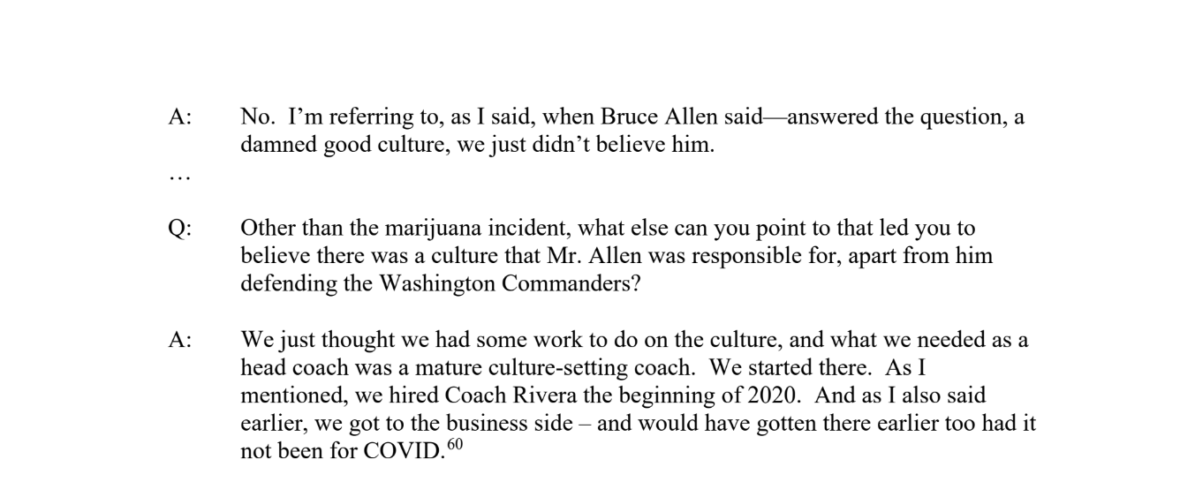
The report claims that Snyder’s lawyers also sent the media unflattering documents and emails from the Commanders email accounts of former employees, including Melanie Coburn, a former cheerleader.
The report claims that Ms. Coburn and another former employee were allegedly offered “financial compensation by Mr. Snyder in exchange for signing non-disclosure agreements to ‘keep them from talking further’ during the Wilkinson Investigation.”
The Committee’s investigation also revealed that Snyder allegedly refused to release several potential witnesses from non-disclosure agreements so they could testify before Congress.
The NFL’s Alleged Involvement
The Committee’s investigation shows that the League was allegedly “aware of Mr. Snyder’s efforts to impede Ms. Wilkinson’s investigation, including by blocking access to information related to sexual assault allegations against him.”
The report says,
“Lisa Friel, the NFL’s Senior Vice President and Special Counsel for Investigations, even filed an affidavit in that case, detailing efforts by Mr. Snyder’s lawyers to silence the employee who had accused Mr. Snyder of sexual assault and to prevent the release of this employee from her NDA.”
Snyder’s Testimony & Private Investigators
Snyder testified before a Congressional Committee back in July for more than ten hours but the transcript and recording of the testimony was never released.
The report goes on to say that Snyder initially refused to attend a public hearing on the topic and when he did testify, he “failed to provide full and complete testimony,” and provided testimony to the Committee that was “often evasive or misleading.”
Snyder has been criticized for allegedly hiring a private investigation firm to look into allegations made against him and the team. Several former employees, including team cheerleaders, claim that private eyes showed up at their homes, at the direction of Snyder to intimidate them. Snyder has denied that this is true and claims he hired private investigators related to his defamation lawsuit.
“Mr. Snyder testified over 100 times that he did not know or could not recall basic facts about his role as owner of the Commanders,” the report reads. “For example, although Mr. Snyder admitted to using private investigators, he testified that he was “unaware” whom his investigators approached and did not “remember” having conversations with his counsel about the individuals targeted.”
The probe accuses Snyder of “using private investigators to surveil and intimidate individuals who spoke out against him.” Saying, the “fruits of Mr. Snyder’s efforts were compiled into dossiers and used to make ‘several presentations’ to the NFL and Ms. Wilkinson to convince them that Mr. Snyder was not responsible for the Commanders’ toxic workplace culture.”
The Committee claims that Snyder’s lawyers made at least seven presentations to the NFL and the Wilkinson law firm between November 2020 and February 2021 in an alleged attempt to shift blame for accusations against Snyder.
Background
The Snyder saga first began on July 16, 2020, when the Washington Post published an exposé, based on interviews with 15 former female employees, detailing allegations of a long pattern and practice of harassment and bullying.
Following the Post report, the Team hired Beth Wilkinson, a former federal prosecutor “to conduct a thorough independent review of this entire matter and help the Team set new employee standards for the future.”
On August 26, 2020, the Washington Post published a second story with new allegations of sexual misconduct against Snyder.
Former employees have alleged that Mr. Snyder directed Team executives to produce lewd videos of nude cheerleaders that were allegedly filmed without permission as they changed during a swimsuit calendar photo shoot.
On August 31, 2020, the NFL announced it would take over the oversight of the Wilkinson Investigation.
Snyder Testimony About Lewd Cheerleader Videos
The Congressional report released a transcript of Snyder’s testimony under oath regarding the alleged lewd videos and his alleged involvement:
“Q: What did you do in response to learning about these lewd videos?
A: I can’t recall what was done. I can’t recall.
Q: You don’t have any recollection of what you did after learning that your team was making lewd videos with unauthorized naked shots of members of your cheerleaders?
A: I can’t recall what the team did.
Q: I’m asking what you did, Mr. Snyder.
A: What I did is just tell the truth and deny this, about me.
Q: You told the truth and denied it, meaning denying that these videos exist?
A: Denying that anything—that I’ve ever seen these purported videos, and I have no knowledge of them.
Q: Is it your testimony, sir, that you read these allegations and the one thing you did was deny them?
A: No, no. I’m just—you know, I can’t recall what the organization did.
Q: And are you saying, Mr. Snyder, that you have no information about what the organization did in response to this?
A: I can’t recall.
Q: Are you not here today, Mr. Snyder, to testify on behalf of the organization of which you are the owner and the co-CEO?
A: Yes.
Q: Yet you cannot tell me what the team did in response to these allegations regarding lewd videos?
A: I can’t recall.
Q: You can’t even tell me whether the team ascertained whether or not these were authentic videos?
A: I don’t want to guess. I just can’t recall.
Congress said that Snyder could not recall or answered evasively more than 100 times during his testimony regarding his role in personnel decisions, his knowledge of sexual harassment by senior team members, the settlement of claims and his attorneys allegedly offering money to former employees for them to sign NDAs, among other topics.
NFL’s Alleged Inaction
The report also accuses Snyder of trying to prevent an accuser from sharing information with Ms. Wilkinson about Snyder’s alleged sexual misconduct. The report claims that in April 2009, a female employee “accused Mr. Snyder of groping her, attempting to remove her clothes, and asking her for sex during a cross-country flight on his private plane while returning from a work event. The employee reported the assault to then-General Counsel Dave Donovan, who notified Mr. Snyder of her allegations.”
The probe says that the NFL denied knowing about the allegation and therefore did not investigate it as per its Code of Conduct policy. Snyder allegedly claimed he disclosed the allegation to the NFL, but Goodell contested that in Congressional testimony, according to the report.
“When Commissioner Goodell was asked at the Committee’s June 22, 2022, hearing whether he was informed of the sexual assault allegations against Mr. Snyder in 2009, he responded: “I don’t recall him informing of that, no.” Counsel for the NFL confirmed to Committee staff that the League was aware of a “dispute that the WFT had with an employee that the WFT wanted to resolve via arbitration,” but stated: “The specifics of the underlying dispute were not disclosed to the NFL in 2009.”
The NFL told Congress that it didn’t learn of the allegations, which Snyder allegedly settled, until 2020, during the Wilkinson investigation.
“Commissioner Goodell confirmed during the Committee’s hearing that failure to report sexual assault allegations would itself be a violation of the League’s Personal Conduct Policy. Despite this, and the NFL’s position that it was never informed of this allegation until July 2020, the NFL’s July 1, 2020, press release announcing the outcome of Wilkinson Investigation did not contain any finding that such a violation by Mr. Snyder had occurred. Instead, the NFL also allowed Mr. Snyder to continue overseeing the Wilkinson Investigation for a month after allegedly discovering the 2009 settlement in July 2020, despite Commissioner Goodell’s admission that the NFL was required to conduct the investigation after it became aware of the allegation.”
The report goes on to criticize Commissioner Goodell for asking Wilkinson to do an oral briefing in lieu of a written report following her investigation, claiming it breaks course with the history of NFL investigations.
“Although the NFL claimed that it refused to release written findings to “better preserve” the anonymity of witnesses and the confidentiality of investigative information, in 2014, the NFL authorized the full release of a 144-page report reflecting the findings of an investigation into allegations of harassment and bullying by Miami Dolphins football players “without any redactions or modifications” due to the “extraordinary public interest” in the matter.”
The report ends by underscoring alleged failures by the league itself in preventing alleged misconduct in its own front office .
“The League Office failed to ensure that its own workplaces are free from discrimination and harassment. In April 2022, six state attorneys general warned the NFL to address allegations of workplace harassment and gender discrimination after more than 30 former League Office employees, many of whom spoke on conditions of anonymity due to non-disclosure agreements or fear of retaliation, described “a stifling, deeply ingrained corporate culture that demoralized some female employees, drove some to quit in frustration and left many feeling brushed aside.”
The report goes on to mention past allegations of sexual harassment within several NFL clubs including the Panthers, Raiders and Cowboys organizations. The 79-page document says that Representative Carolyn Maloney has introduced two bills to work to prevent sexual harassment and toxic workplace retaliation.
Republicans are set to take over the House in the new year and many have criticized the Congressional Committee’s efforts to investigate the Commanders, vowing to abandon the effort. However, Maloney who spearheads the Committee has justified the effort by saying that if a culture of sexual harassment and assault is accepted or perpetrated within the NFL, America’s biggest sports league, then all Americans need new legislation and better protections moving forward.
Snyder has denied all of the allegations levied against him.
Below are the key findings from the Congressional report, which are all allegations against the NFL and Snyder made by the Congressional Committee based on its investigation:
“1. Dozens of employees at the Commanders were harmed by a toxic work culture for more than two decades. The Team’s owner permitted and participated in this troubling conduct:
The Committee’s February 3, 2022, roundtable revealed allegation that Mr. Snyder inappropriately touched former employee Tiffani Johnston at a work dinner and attempted to “aggressively push” her into his limousine until he was stopped by onlookers.
Brad Baker, a former video production employee, described how Team executives “tasked us with producing a video for Snyder of sexually suggestive footage of cheerleaders, obviously unbeknownst to any of the women involved.”
Melanie Coburn, a former cheerleader and marketing employee, stated: “At cheerleader auditions one year, Mr. Snyder ordered the director of the squad to parade the ladies onto the field while he and his friends gawked from his suite through binoculars.”
Dave Pauken, the Team’s former Chief Operating Officer, testified, “There wasn’t a year that went by where Dan didn’t push me to allow Dennis Greene or other people in the sales and marketing staff to allow sponsors or other paying guests to attend a calendar shoot,” indicating that the Team’s owner personally encouraged the exploitative practice previously exposed by the New York Times.
Bruce Allen, the Commanders former President testified that, “from time to time,” Mr. Snyder would warn him: “I want to know everything. Don’t let me find out about it.”
In his Committee deposition, Mr. Snyder purported to “apologize for any workplace misconduct of the team,” but he blamed others around him and minimized the experiences of more than 100 current and former Commanders employees who had spoken up about the Team’s toxic culture, claiming their stories were “possibly” orchestrated by a former employee with a “negative agenda” whom Mr. Snyder had accused of trying to bribe his staff.
2. Commanders’ leadership perpetuated a toxic workplace culture by ignoring and downplaying sexual misconduct by senior male Commanders employees.
Mr. Pauken testified: “There was a [female] member of the public relations staff that was groped by a member of the coaching staff at an event.” He described how he “talked to Dan about it, and I knew what we were going to do and—which was nothing. And we told the person to just stay away from the coach, we would do our best to keep the coach away from you, but stay away from the coach.”
Brian Lafemina, the Commanders’ former President of Business Operations and Chief Operating Officer, testified that he informed Mr. Snyder that an employee “had come to him to let him know that she had felt uncomfortable over a period of time with her interactions with senior executive Larry Michael, the fact that he had commented about her appearance in public at events where he was the emcee and she was working the event, and that at times he had touched her on the cheeks and kissed her on the forehead.” According to Mr. Lafemina, Mr. Snyder responded that “Larry was a sweetheart and that Larry wouldn’t hurt anybody.”
3. The owner of the Commanders interfered with the Wilkinson Investigation by launching a shadow investigation into suspected sources of the Washington Post exposés, attempting to block Ms. Wilkinson’s access to information, and trying to silence employees who could implicate him in misconduct.
The Committee found that Mr. Snyder abused the subpoena power of federal courts on at least ten separate occasions by filing a defamation lawsuit against an obscure media company in India in order to obtain private emails and communications from his perceived detractors in the United States, including former employees who spoke out about sexual misconduct at the Commanders.
In his Committee deposition, Mr. Snyder testified that his shadow investigation had “[n]othing to do with the workplace investigation” and instead “had to do with the fact that we were defamed” on a website based in India. However, this testimony appears to be misleading at best. The Committee uncovered evidence that Mr. Snyder and his lawyers made at least seven presentations to the NFL and Ms. Wilkinson aimed at convincing the League that Mr. Snyder was the victim of a smear campaign related to misconduct allegations and that others were to blame for his team’s toxic workplace. Mr. Snyder and his attorneys made only a single presentation to former Attorney General Loretta Lynch, who Mr. Snyder said had been hired by the NFL to review his defamation allegations. That presentation “covered some of the same subject matter presented to the Wilkinson firm.”
Mr. Snyder claimed in his deposition that a 100-page dossier created by his lawyers was “solely” related to his defamation lawsuit in India and had “nothing” to do with the Wilkinson investigation into the Commanders’ workplace. However, the Committee confirmed that Mr. Snyder’s lawyers shared this dossier with Ms. Wilkinson’s firm and that the dossier itself is closely related to the facts underlying the Wilkinson Investigation. Dozens of slides discuss the journalists who wrote the Washington Post exposés on the Team’s toxic workplace and the victims identified in the articles—called the “Accusers” in the dossier.
Throughout the Wilkinson Investigation, Mr. Snyder sent private investigators to the homes of former employees. Mr. Allen testified in a Committee deposition that around March 2021, Mr. Snyder sent private investigators to his home in Arizona. The investigators told Mr. Allen that they were “just here to follow you” and “document your actions.” Mr. Allen testified that Mr. Snyder commented on his plans to use of private investigators to follow other individuals, including Commissioner Roger Goodell.
Mr. Snyder used former Commanders General Counsel Dave Donovan as a proxy to sue Ms. Wilkinson in federal court to block her from accessing or disclosing information related to a 2009 sexual assault allegation, including a $1.6 million confidential settlement. Documents show that Ms. Wilkinson accused the Commanders of intervening “in the Donovan litigation and launch[ing] a series of attacks against Ms. Wilkinson.”
Mr. Snyder offered hush money to silence several former employees during the Wilkinson Investigation. New evidence shows that in February 2021, lawyers for Mr. Snyder “offered financial compensation” to former employees “who did not have live legal claims, but who had been vocal in their criticisms of the Team in order to secure additional non-disclosure agreements (NDAs) and keep them from talking further.”
4. In addition to failing to appear at a public hearing, Mr. Snyder interfered with the Committee’s investigation by intimidating witnesses and blocking the production of documents.
Contrary to claims by Mr. Snyder’s counsel that Mr. Snyder “never prevented” former cheerleader Abigail Dymond Welch “from sharing information with the Committee,” Mr. Snyder refused to release Ms. Welch and other witnesses from their non-disclosure agreements to facilitate their full and complete testimony before the Committee.
On the eve of Mr. Allen’s deposition, lawyers for Mr. Snyder sent the Committee a batch of internal emails containing inappropriate content from Mr. Allen’s Commanders email account so “that Mr. Allen will have an opportunity to review them prior to his deposition.” The emails included those that had been leaked to the Wall Street Journal and New York Times in October 2021.
Mr. Snyder used a secret common interest agreement with the NFL to prevent the League from turning over more than 40,000 documents from the Wilkinson investigative file to the Committee, including the Wilkinson Investigation findings, several PowerPoint presentations that Mr. Snyder made to the NFL and Ms. Wilkinson during the Wilkinson Investigation, a 2018 human resources audit report showing deficiencies in the Commanders’ human resources department, a 2009 confidential settlement that resolved sexual assault allegations against Mr. Snyder, and 2008 and 2010 videos of outtakes from cheerleader photoshoots.
5. The NFL was aware of serious interference with the Wilkinson Investigation but failed to take action to stop it.
New evidence uncovered by the Committee shows that the NFL was repeatedly notified that Mr. Snyder continued to use private investigators even after the League instructed him to stop “investigating any of these matters” in August 2020. In April 2021, Bruce Allen notified the NFL that Mr. Snyder had sent private investigators to his home, and in September 2021 an attorney representing Brad Baker informed the NFL that private investigators had contacted her client’s friends and family members.
A senior NFL official, Senior Vice President and Special Counsel for Investigations Lisa Friel, admitted in a private communication with Mr. Allen more than a year ago that Mr. Snyder’s shadow investigation and abuse of federal courts violated NFL policy. Mr. Allen testified that around April 2021, he notified NFL’s counsel that Mr. Snyder had used emails from his Commanders email account in a federal court action. In response, Ms. Friel acknowledged that Mr. Snyder’s action was “conduct detrimental” to the integrity of the League.
6. The NFL misled the public about its handling of the Wilkinson Investigation and continues to minimize workplace misconduct across the League.
New evidence uncovered by the Committee shows that key aspects of the NFL’s resolution following the Wilkinson Investigation was negotiated with the Team’s owner, including the language in the NFL’s July 2021 announcement, the $10 million penalty levied against the Commanders, and the recommendations for the Team to implement.
Although the NFL claimed that it refused to release written findings to “better preserve” the anonymity of witnesses and the confidentiality of investigative information, in 2014, the NFL authorized the full release of a 144-page report reflecting the findings of an investigation into allegations of harassment and bullying by Miami Dolphins football players “without any redactions or modifications” due to the “extraordinary public interest” in the matter. The investigators in the 2014 matter displayed “sensitivity to issues of privacy and requests for confidentiality” by anonymizing witness names and withholding certain details from publication.
Despite the NFL’s September 2020 engagement with the Wilkinson law firm to “complete a written report of its findings,” Commissioner Goodell testified at the Committee’s June 2022 hearing that he abandoned this plan and decided to receive an oral, rather than written, briefing of the Wilkinson findings in October 2020. Ms. Wilkinson, however, stated in recent litigation related to allegations of sexual misconduct against Mr. Snyder: “The public’s interest is to know the truth—one way or another— about the matters at issue in this lawsuit.”
The Committee’s investigation shows that the NFL has not protected workers from sexual harassment and abuse, has failed to ensure victims can speak out without fear of retaliation, and has not sought true accountability for those responsible, even after decades of misconduct. Congress should act swiftly to address these deficiencies and protect workers across the United States.“
Categorized:Breaking News LOJ Exclusives More NFL The Latest Top Stories

